T: 01822 851370 E: [email protected]
Visit RSN Survey about life in rural England to find out more.
December Edition of Casebook from the Rural Health and Care Alliance
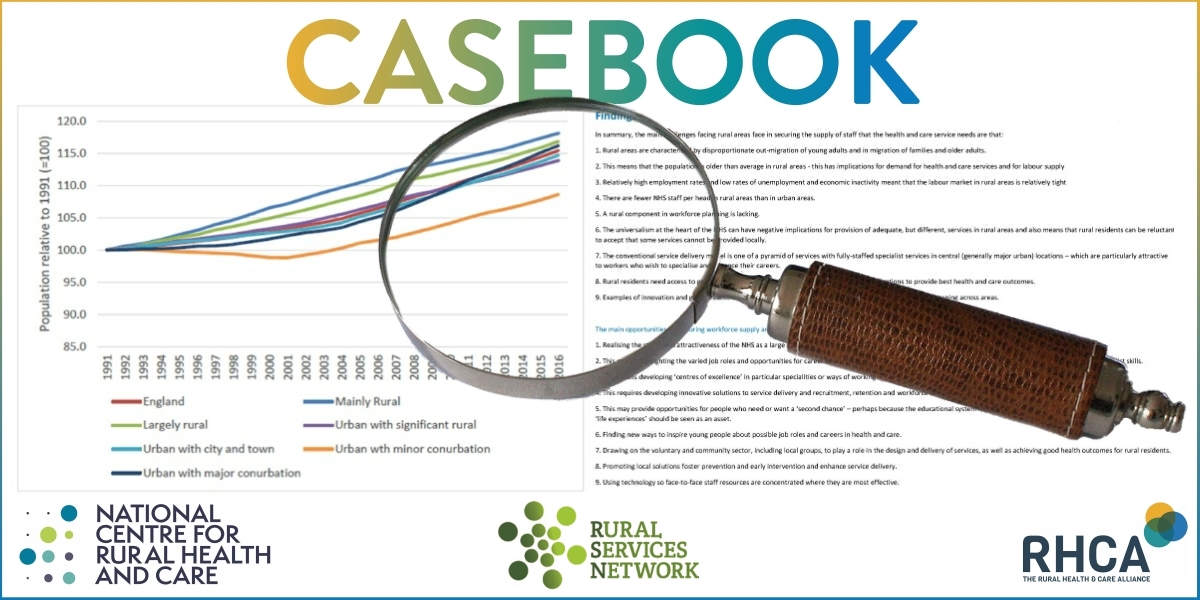
December 2023 Edition
In this final edition of Casebook for 2023 we focus on parliamentary health news, the latest rural health research, the importance of robust digital infrastructure for safe telecare provision and share presentations from our latest health seminar. Read on to find out more…
Integration is key to health service improvement says Lords Committee

Ivan Annibal, Operations Director at the National Centre for Rural Health and Care recently gave evidence at the House of Lords Committee on the Integration of Primary and Community Care, alongside patients, clinicians, researchers and other stakeholders. The Committee published a report on its findings last week.
Key recommendations within the report include:
- Structures and organisation of NHS services need to be streamlined. Integrated Care Systems (ICSs) are a good starting point for collaborative working but their relationship with other healthcare bodies, public bodies, and local government must be based on mutual professional respect. The Department of Health and Social Care (DHSC) should evaluate ICS structures before implementing any major health service reforms.
- There needs to be a more simplified and flexible system for awarding contracts and allocating funds within the NHS to encourage multi-disciplinary, integrated working. DHSC and NHS England (NHSE) should reform the contract process and ensure new contracts are flexible in the commissioning of primary care. The Government should explore different ownership models for GP practices to facilitate more joined-up and better care.
- Efficient data-sharing is crucial to successful healthcare integration. Fragmented systems often require patients to repeatedly provide the same medical information, causing frustration. A properly maintained Single Patient Record (SPR) and the ability for intersectoral data-sharing between healthcare professionals are essential to tackle this issue. The DHSC must issue guidance to standardise data practices and clarify data sharing within privacy laws, to ensure timely patient access to medical data.
- Equipping staff to work across multiple clinical disciplines through improved training will make integration of services easier. Currently, staff spend more time meeting everyday demand, rather than implementing new integration strategies. Clinicians should be introduced to the work of other services through job rotations. Social care needs should also be included in the NHS's Long Term Workforce Plan to ensure that enough well-trained social carers are available.
Click here to access the full report.
Sir John Hayes raises concerns re rural residents with dementia

The Secretary of State for Health and Social Care was recently asked by Sir John Hayes MP what steps she is taking to support people with dementia in rural areas. Her response was that Integrated care boards (ICBs) are responsible for the provision of dementia care services. NHS England expects ICBs to commission services based on local population needs.
NHS England has commissioned the Office for Health Improvement and Disparities Dementia Intelligence Network to investigate the underlying variation in dementia diagnosis rates. This includes the assessment of underlying population characteristics such as rurality and socio-economic deprivation. The aim of this work is to provide context for variation and enable targeted investigation and provision of support at a local level to enhance diagnosis rates.
Research on recruitment and retention of staff in rural dispensing primary care practice

Rural primary care practices struggle to employ and retain staff, and existing literature regarding recruitment and retention is focussed on doctors. Shortages of qualified staff affect practice functioning, quality of care and patient experience. Dispensing of medications is a rural service valued by patients. However, little is known about how dispensing services are valued by practices or related to the recruitment and retention of staff. The National Centre for Rural Health and Care therefore commissioned a qualitative inquiry to understand why this is the case. Four central themes emerged, namely:
- Characteristics of Roles in Rural Dispensing Practice
- Work Environment
- Importance of Dispensing
- Staff Access to Healthcare
You can read the full inquiry here
Rural Areas Still Struggling to Access Healthcare

Healthwatch North Yorkshire has produced a report recently that looked at why people living in our rural areas are still struggling to access healthcare – and what needs to be done to make things better for our NHS and the people who use it.
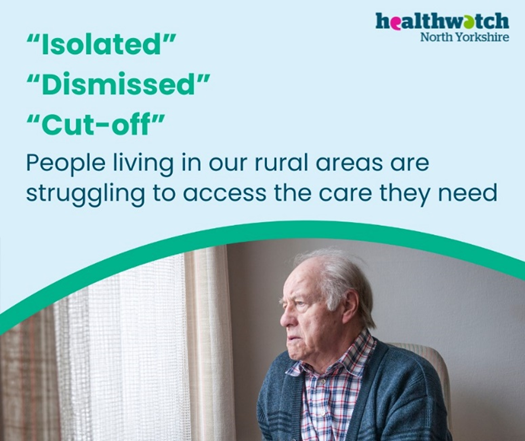 |
There is a 5-minute video summary of the report which can be found below:
Key findings from the research show:
- Many people are struggling to access health care due to the increasing distance to services, inadequate public and community transportation (especially for older and more vulnerable people), and the inaccessibility of health care professionals.
- Health care in rural areas costs more money which has often meant that health service provision and development has been held back by short-term funding.
- Community and voluntary services are filling the gaps left by inadequate health service provision, when local health services have been withdrawn, for example during COVID-19.
- The overall reduction in health service provision in rural North Yorkshire has contributed to both the ‘decay’ and ‘disappearance’ of health services and support.
- The barriers to accessing local health services means people feel abandoned and are less likely to seek help affecting their long-term health and wellbeing.
- People feel more informed about health and social care services in urban and 'central' areas than services located further afield.
- Despite a strong sense of community spirit there are feelings of isolation that permeate in rural communities.
- It's a myth that everyone in North Yorkshire is rich, can easily drive to access NHS healthcare services, otherwise they should 'just move house'. For many people, moving to a rural place when they were younger, healthier, and had access to a car, doesn't automatically mean that it stays that way.
BT pauses some switches to Digital Voice for telecare customers

BT have announced that they are temporarily pausing all non-voluntary, managed migrations to a digital landline where there is any risk that the customer’s telecare service will not continue to work.
In a blog on their website BT say:
“Over the past week, we've been informed about incidents involving telecare users from another communications provider who had been switched to a digital landline. In light of this news, the telecoms industry, including BT, has agreed that the right thing to do is to temporarily pause all non-voluntary, managed migrations to a digital landline where there is any risk that a customer's telecare service will not continue to work.”
The blog goes on to say that
“Together with Government, Ofcom, telecoms providers, charity partners and key industry groups, BT is working hard to ensure that everyone knows about the switchover, how they will be impacted and what they need to do. Further information about the industry wide change can be found here: UK transition from analogue to digital landlines - GOV.UK (www.gov.uk)
Vulnerable customers who have concerns or who haven’t told BT about their circumstances are urged to give BT a call on 0330 1234 150. To find out more about BT’s new home phone service, Digital Voice, please visit: www.bt.com/digital-voice”
The Rural Services Network is a member of the BT Digital Voice Advisory Group and throughout the time of the group, has championed the needs of rural communities, who can experience poor broadband and mobile connectivity and may find the switch to a digital line more challenging.
It is important that rural communities are not left at a disadvantage by the switch, and aren’t unfairly penalised by having to purchase battery backup systems which those in urban areas with good connectivity won’t need to do.
Presentations from Seminar on “Tackling the rural health and care workforce problem”

The National Centre for Rural Health and Care in partnership with the Rural Services Network recently held a seminar on “Tackling the rural health and care workforce problem”. The event considered in depth the points made in the National Centre for Rural Health and Care's paper in response to the NHS Workforce Plan.
The seminar enjoyed an impressive line up of speakers including Nigel Edwards, Chair of the National Centre for Rural Health and Care, Professor Jim Rourke, Professor Emeritus & Former Dean of Medicine, Memorial University of Newfoundland, Canada, Adrian Clements, Executive Medical Director, North Cumbria Integrated Care NHS Foundation, Lisa Hughes, Associate Head of Workforce Transformation, Workforce Training and Education, NHS England and Claire Flavell, Strategic Lead, Lincolnshire Talent Academy
To access a short highlights video from the event, useful links and presentations click here.
We’d love to hear from you - share what you’re proud of
If you have something, you would like us to feature in a future edition, please let us know by clicking here to send us an email.
Spread the word
If you know of other organisations that you think would benefit from joining the Rural Health & Care Alliance, please click here to email us and let us know.
RURAL SERVICES NETWORK
Up to date news on Health and Care
The Rural Services Network provides a useful source of themed news content and data. Check out the latest news on Health & Wellbeing and Vulnerability, where you’ll find articles on a diverse range of rural issues affecting rural communities. You might also find this research on Over 65 Population Projections useful too.
Latest from RSN Member Insights
RSN Member Insights is the place to discover the statistics that define communities within our membership. It is regularly updated with new analyses, and these will be highlighted in the 'What's New' section of the RSN's Weekly Rural Bulletin. The Rural Bulletin also provides a selection of the most rurally topical news items, so do subscribe and encourage your colleagues to subscribe to what is an invaluable weekly periodical.
To make a suggestion of data that would benefit you by being included in the Member Insights section, please email Dan Worth, our Research and Performance Analyst, at [email protected].
| The Rural Health & Care Alliance is a membership organisation administered by the Rural Services Network on behalf of the National Centre for Rural Health & Care. Explore the RHCA service below: |
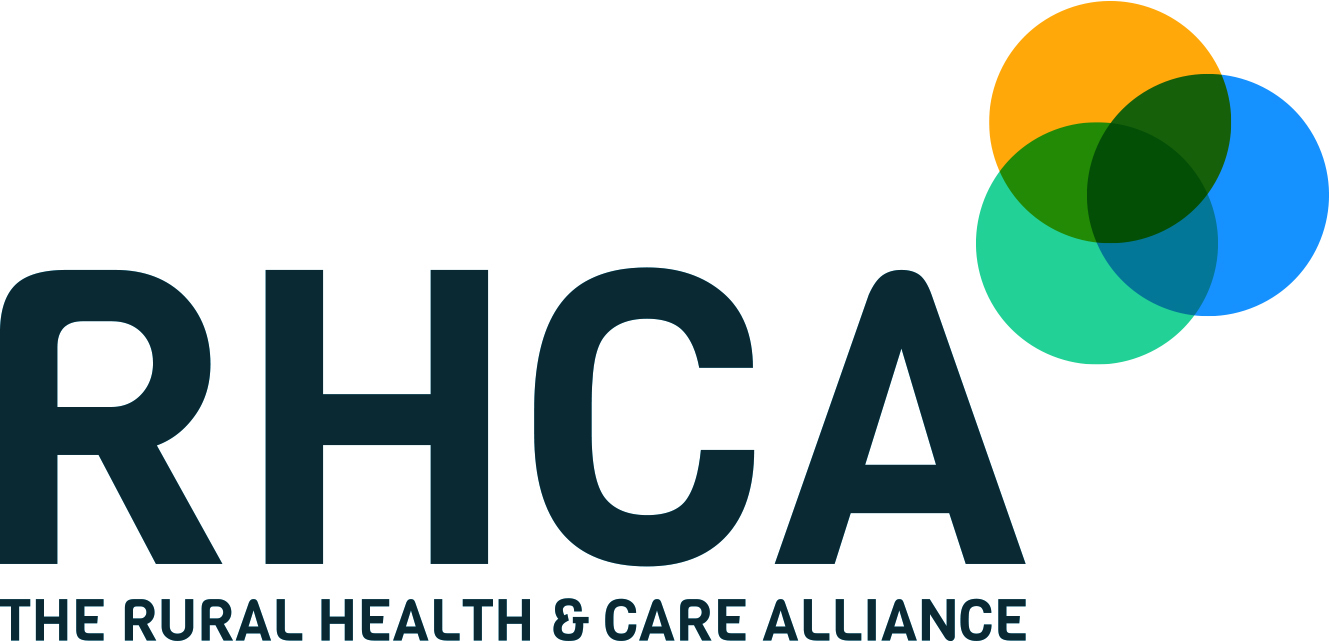 |
 |
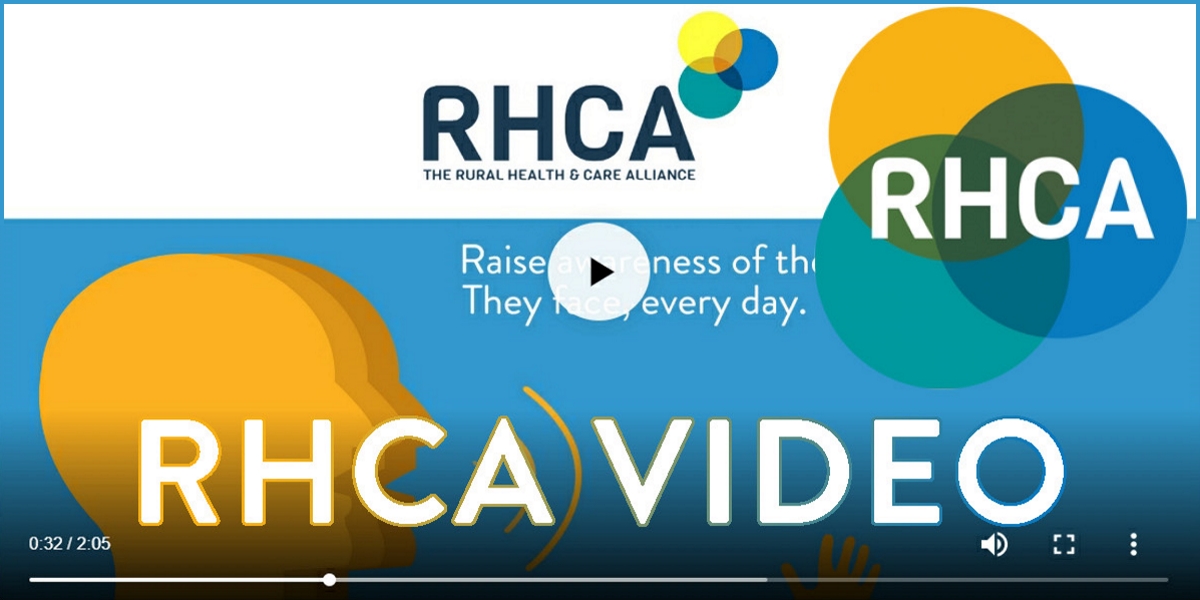 |
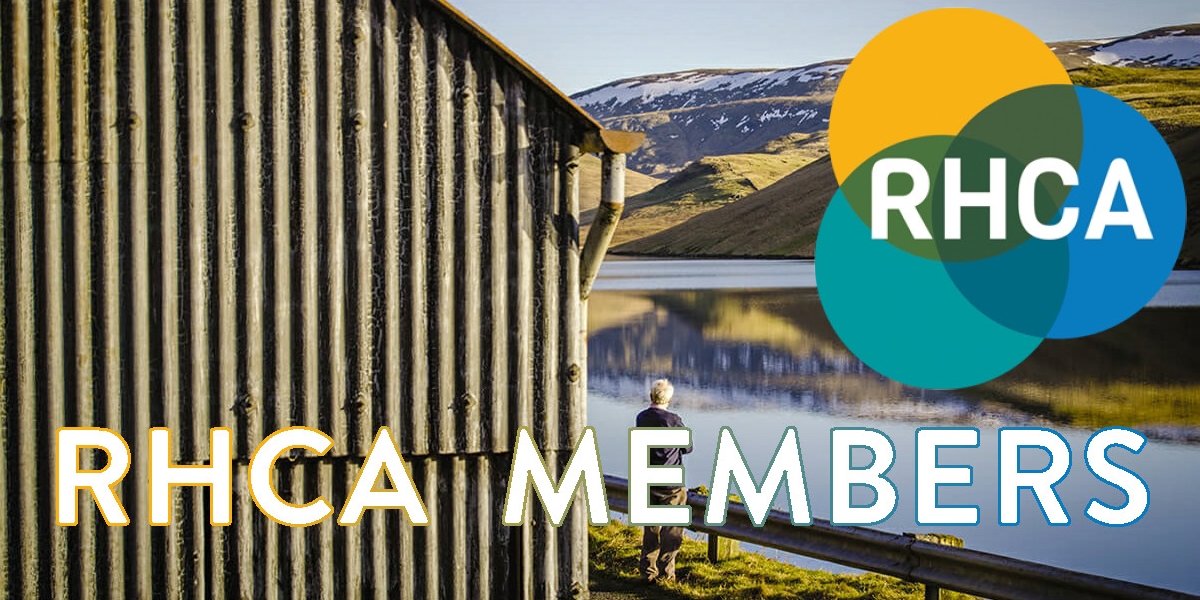 |
 |
 |
 |
 |
 |
 |



